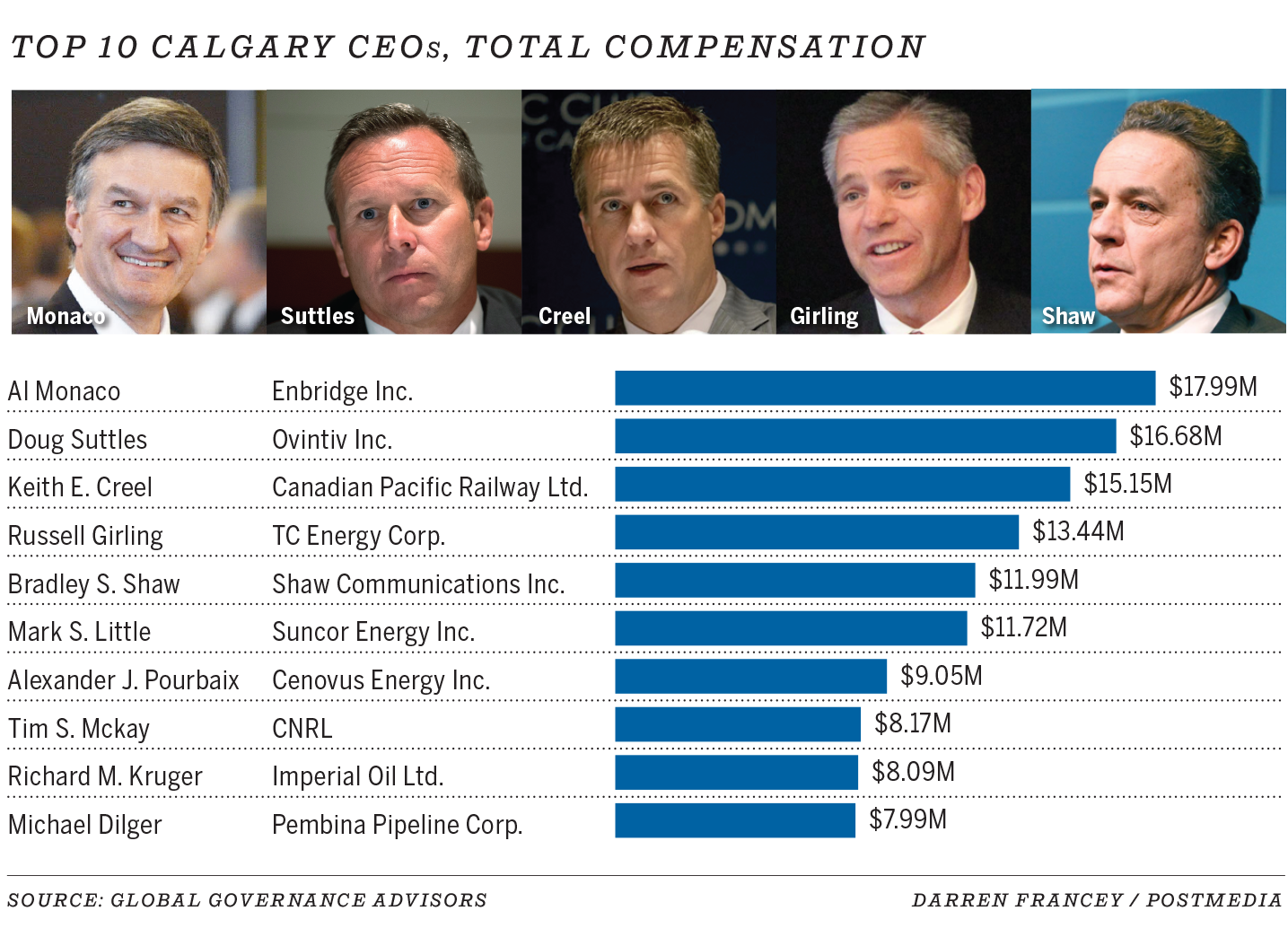
Calgary companies clawed back CEO bonuses and long-term incentives in 2019, as economic growth in Alberta came to a shuddering halt.
Total compensation for executives at Calgary’s largest 100 publicly traded companies declined by a median 9.5 per cent last year, according to new data compiled for Postmedia by Global Governance Advisors. The median annual bonus awarded to executives at those same companies declined 11.5 per cent, while long-term incentive plan rewards (such as pension plan contributions and stock options) fell 11.6 per cent.
The numbers are an indication of the economic pain felt in Alberta in 2019, a year in which provincial GDP contracted by 0.6 per cent, according to Statistics Canada. At the start of the year, many economists had predicted 2019 would bring a return to growth, but those hopes were dashed by a lack of oil pipeline capacity and resulting uncertainty that led to reduced capital spending in the oilpatch, and prompted the provincial government to curtail oil production.
Anup Srivastava — associate professor at the University of Calgary’s Haskayne School of Business and a Canada research chair in accounting, decision-making and capital markets — said it’s no surprise to see CEO and executive pay in Calgary rise and fall with the economy, as most companies aim to incent talent by linking pay to performance.
“At the CEO level, there is a huge correspondence to the economy simply because of the linkage to performance — both operating performance and stock price performance,” Srivastava said.
However, he said the oil sector in particular — globally, not just in Calgary and Alberta — has historically been known for its exceptionally high levels of executive compensation. After five years of oil price slump and with energy companies becoming leaner in size, he said there’s an argument to be made that CEO pay has been too high.
“Executives are suffering, it’s not that they aren’t suffering. A big portion of their compensation comes from stock or stock options and so, automatically, a lot of their take-home pay is just gone,” Srivastava said. “But if we continue to see WTI in the $30s, a lot of these companies are not viable. A 20 to 25 per cent pay cut for the CEO will not make any difference to a company’s profit and loss statement, but for optics it becomes important.”

In 2019, the year-over-year average market cap of the 100 Calgary-headquartered companies surveyed for Postmedia increased nearly 17 per cent over 2018. But since the beginning of 2020 and the double economic whammy of COVID-19 and the oil price shock, the average market cap for Calgary’s Top 100 companies has declined by 27 per cent. Ninety-four per cent of the companies surveyed and 15 out of the 15 industry sectors on the list have seen their market cap decline since the start of this year.
As a result, many Calgary-based companies have cut capital expenditures and made commitments to reduce executive salaries, often in the range of between 12 and 20 per cent.
Arden Dalik, senior partner with Global Governance Advisors, said it remains to be seen how long those rollbacks will be in place.
“In the past, companies have always brought (CEO salaries) back up, some very aggressively, some phased in over time,” she said. “But depending on the timing of recovery, this time boards may feel a need to keep them back down. They know it has to pass the sniff test with shareholders.”
In 2019, 54 per cent of Calgary-headquartered companies had negative performance in terms of total shareholder return, compared to just 15 per cent of Canada’s top 100 companies. Dalik said while the energy sector is taking a beating again in 2020, the COVID-19 pandemic means Alberta companies won’t be alone in their pain.
“I don’t think we’ve seen the full effect (of the pandemic) Canada-wide yet, I think we saw it in Alberta early,” Dalik said. “But a lot of other sectors and provinces are being heavily affected.
“I think we’re sort of leading the pack in getting taken to our knees, but we won’t be alone.”
You can read more of the news on source
